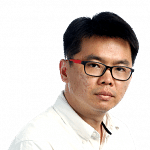SINGAPORE - It is set to face a one-third reduction in manpower supply by 2030, but the Singapore Armed Forces (SAF) is confident of coping with tighter resources even as it tackles new threats such as terrorism and cyber attacks, said Defence Minister Ng Eng Hen.
Also, Singapore does not have the luxury of devoting more resources to fight terrorism and cyber attackers by cutting back on combat staffing, said Dr Ng, adding that "it is not a wise thing to do".
"If you have a scenario with multiple attacks in Singapore, we'll need all hands on deck and that's why we are training 18,000 national servicemen every year to be able to do homeland security," he added in an interview this week ahead of the SAF Day tomorrow (July 1).
"So we'd rather upsize our capability and potential to draw from people who are trained."
The SAF is instead tackling the manpower challenge by relying on increased automation and motorisation, said Dr Ng, citing how more than half of the next-generation of SAF would be on wheels, compared to less than a quarter in 2010.
For instance, the Republic of Singapore Air Force has developed a Combat Management System within its enhanced Island Air Defence System that provides real-time evaluation of the air situation so as to make informed decisions swiftly.
Also, the SAF is relying on less manpower-intensive weaponry, with the Singapore navy's frigates using 30 per cent less manpower than other similar vessels.
For example, with a three-man crew, the SAF's Himars (High-Mobility Artillery Rocket Systems), which is mounted on a truck, can hit targets 70km away, compared to a previous artillery system that needed a 12-man team, who had only a 40km range and had to leave the firing site on foot.
"So I would say that we are confident that we can meet these challenges, but we are not complacent," said Dr Ng.
Also, there are limitations as a soldier with duo vocations may not have enough time to develop expertise and build up cohesiveness with his unit during a two-year national service stint, said Dr Ng.
Despite the constraints, Dr Ng said he is confident over Singapore's future when it comes to military defence, citing how more than 60 per cent of pre-enlistees have chosen to be infantry and guardsmen, which are deemed "tough" vocations.


